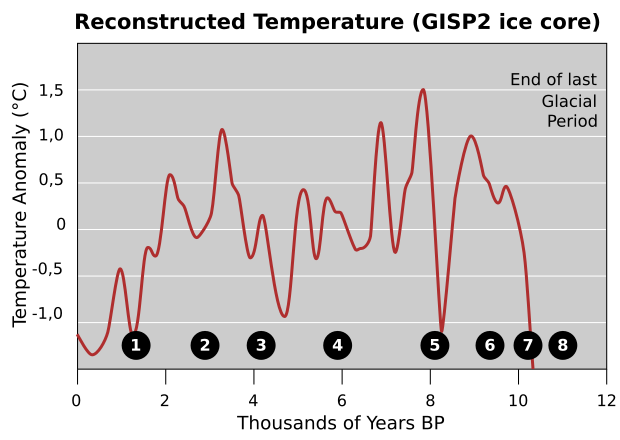The obvious answer was also referred to at "Standing on The Shoulders of Giant Midgets": the sun. (Good name for a blog:) Even a moderate change in solar activity could not just cause global warming, it could turn the Earth into Mars pretty fast. And it happens sometimes - it could happen tomorrow, because of internal mechanisms in the sun that we have know knowledge of nor understanding about.
Another answer, from my very limited knowledge of paleoclimatology, is that sometimes it just happens - has happened - and current science really isn't sure why, although a change in the solar activity cycle is one of the best theories.
Most of the known abrupt climate change events cause global cooling, not warming: shutdown of the Atlantic conveyor (aka "The Day After Tomorrow", a favourite topic from my old blog) or perhaps a bolide/meteor impact (aka "Deep Impact", or an ELE - Extinction Level Event). But the fossil and ice core record shows abrupt warming as well as abrupt cooling - the end of the Younger Dryas event in 9600 BC is the most recent and one of the most dramatic examples.
It is likely that major abrupt changes in ocean currents are a major contributing mechanism - just as the shutdown of a warm current (like the Gulf Stream) would cause global cooling, shutdown of a cold current (like the N. Pacific/California current) would probably cause abrupt warming, turning California into a hot, moist climate like Florida, as well as changing the whole circulation of weather in the Northern Hemisphere. Other than geologic phenomena involving thermal activity deep in the earth's core, the likely culprit behind such big changes in thermohaline circulation would again be solar activity.
Now for a gratuitous oceanography link.
This page at Woods Hole talks about abrupt climate change. Here's a quote:
Most of the studies and debates on potential climate change, along with its ecological and economic impacts, have focused on the ongoing buildup of industrial greenhouse gases in the atmosphere and a gradual increase in global temperatures. This line of thinking, however, fails to consider another potentially disruptive climate scenario. It ignores recent and rapidly advancing evidence that Earth’s climate repeatedly has shifted abruptly and dramatically in the past, and is capable of doing so in the future.That's the real science. Our whole world could go "poof" tomorrow and we might never know why. (OK - That's a little bit of an exaggeration, but only a little.)
Woods Hole goes on:
Fossil evidence clearly demonstrates that Earth's climate can shift gears within a decade, establishing new and different patterns that can persist for decades to centuries. In addition, these climate shifts do not necessarily have universal, global effects. They can generate a counterintuitive scenario: Even as the earth as a whole continues to warm gradually, large regions may experience a precipitous and disruptive shift into colder climates.That's the "Day After Tomorrow" scenario again, based on changes to thermohaline circulation.
Here's a link to a scientific paper from the Russians on this subject. It says that long-term solar cycles (hundreds and thousands of years) can cause surprising and abrupt climate change when those cycles begin and end, by affecting global climactic processes, including thermohaline circulation. In other words - the abrupt global warming scenario could be caused by the beginning or end of a normal, non-extreme, solar cycle.
Another scenario is the onset of a Bond Event (no, not the remake of "Octopussy"). Bond events are the recent name for the Holocene-era analogues to Dansgaard-Oeschger events, or abrupt climate changes that occur every ~1470 years. When was the last Bond event? 1400 years ago. Likely causes of Bond events? Solar activity and "reorganizations of atmospheric circulation".
Here's an informative graphic:

Note where we are on the graph relative to the temperature.
So if I were to write a science fiction story about this subject, I would use a huge and unforseen increase in solar activity coinciding with the now-impending end of the Bond Cycle to cause a major change in thermohaline circulation - increasing the velocity of warm (northerly) currents and decreasing flow of southerly currents. Southerly currents are caused by sinking of water cooled by evaporation. Increased warmth caused by greater solar output could increase high-latitude humidity, decreasing evaporation and accelerating the effect.
Would this, could this, really happen? Science apparently isn't sure, although it is feasible, which is why it would be good science fiction.
